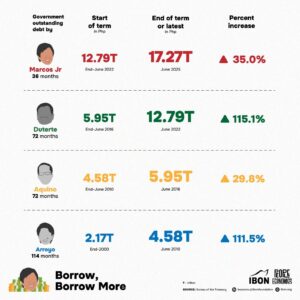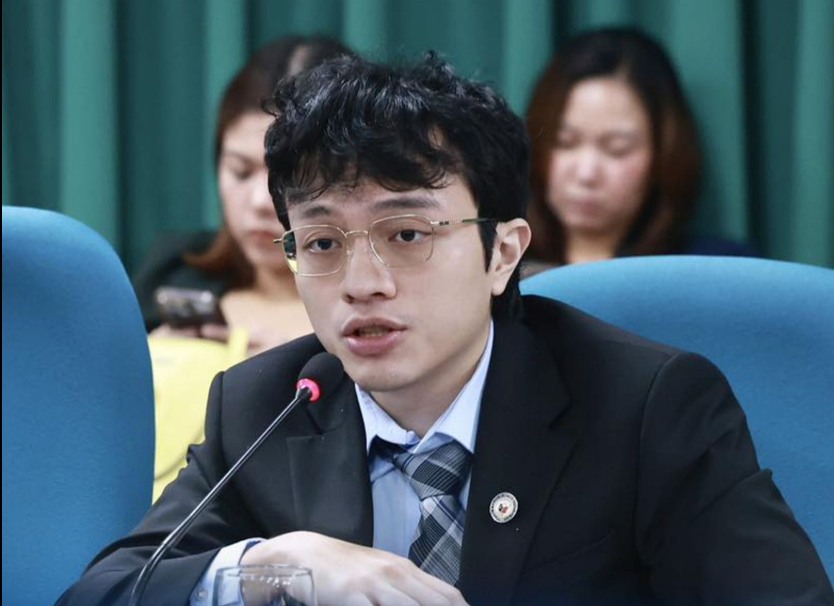📷: IBON Foundation | FB
By Diego Morra
Each President wants to craft a motto or a catchphrase to promote his administration and Ferdinand Marcos is no exception. This explains why he coined “Bagong Pilipinas“ to describe a country that is supposed to be polite, united in achieving progress and, to an infinitely strange degree, its people are not given to muckraking, political intrigue and character assassination.
Inasmuch as they themselves cannot define what they really mean by “Bagong Pilipinas” and differentiate it from the “New Society” of the unlamented Ferdinand Marcos Sr. fascist dictatorship from 1972 to 1986, the contest now is for Filipinos to venture into defining what makes the Marcos Jr. administration unique and suggest what best describes it. Leafing through the newspapers daily, one is struck by stories on Philippine external debt, and how it ballooned with little control from the time an economist like Gloria Macapagal Arroyo took, or wrested, power.
Thus, the suggested tag: “Utangerong Gobyerno” (UG) para sa “Bagong Pilipinas.” Indeed, Philippine debt has skyrocketed to P17.27 trillion by June 2025 as reported by the Bureau of Treasury (BTr), meaning each Filipino owes P153,000 and P628,909 for each of the country’s 27.5 million families. How then could there be a “Bagong Pilipinas” when the country is sinking in debt, its financial geniuses unable to increase government revenues and both the Bureau of Customs (with a 35% share) and the Bureau of Internal Revenue (BIR) which collect at least 65% of all government revenues?
Assessing the Marcos Jr. fiscal quagmire, the Kilusang Magbubukid ng Pilipinas (KMP) said the regime appears to lack the creativity and the political will to crack the whip, push both the BIR and the BOC to be more efficient in collecting taxes and duties. Inasmuch as Marcos Jr. has organized the Philippine oligarchy into what is now known as the Private Sector Advisory Council (PASC), he should have asked his billionaire pals to help him out, first by settling their tax obligations, or even request them to pay in advance. The oligarchs whose corporations gained huge profits by controlling power generating facilities, water concessions and local water districts have been asked to renegotiate their one-sided deals to give government a fair shake.
These things Marcos Jr., did not do. KMP argues that the President should have rocked the boat, as it were, for the simple reason that these rentiers have benefited from the liberalization, deregulation and privatization policies inflicted by the Washington Consensus for decades and institutionalized by the country’s accession to the General Agreement on Tariffs and Trade (GATT) and its successor, the World Trade Organization (WTO.) For KMP, Marcos Jr. did not stop the country’s financial hemorrhage that worsened from Arroyo’s incumbency. Marcos Jr.’s reckless borrowing spree prioritizes debt-driven infrastructure and militarization while neglecting urgent social services and genuine agricultural development.
Today, farmers and rural families are trapped in a severe agricultural crisis marked by low productivity and inflation while annual disasters push them down the abyss of grinding poverty. Since Marcos Jr. took power in June 2022, the national government debt ballooned from P12.79 trillion to P17.27 trillion in just 36 months, marking a 35% increase. By comparison, the Duterte administration increased the debt by 115.1% over six years, from P5.95-trillion in June 2016 to P12.79-trillion in June 2022, or an increase of P6.84-trillion or 115.1%. The administration of the late President Benigno Simeon Aquino III raised the debt stock for six years by P1.37-trillion or only 29.8%, or from P4.58-trillion in June 2010 to P5.95-trillion in June 2016, the lowest increase among Presidents. In the 114 months of Arroyo, the national government raised the debt from P2.17-trllion in June 2000 to P4.58-trillion in June 2010, or 111.5%. Under Arroyo, the country also became the biggest rice importer worldwide.
KMP argued that the unremitting debt accumulation has become an addiction to the Philippine government since the Arroyo regime, which has championed neoliberalism and promoted the dismantling of tariff walls protecting the Philippine agricultural sector while granting foreign investors tax and duty perks in addition to guaranteeing a docile work force to man their factories and sweatshops in the so-called export-processing zones. Farmers have also savaged the Marcos Jr. administration for not redeeming its pledge to prioritize food security as the 2025 national budget allocates trillions of pesos to infrastructure, debt servicing, and defense.
There is inadequate funding to agriculture, education and health. KMP said rising poverty and hunger are the direct consequences of these fiscal choices. Citing recent data confirming that at least 63% of the entire population lives in poverty, KMP condemned this as a “damning indictment of Marcos Jr.’s anti-poor governance.” The debt crisis will worsen, the group predicted, as the Philippine economy now depends on debt to finance itself. Call this the result of the UG government’s being addicted as an “aliping-bayad utang.”




